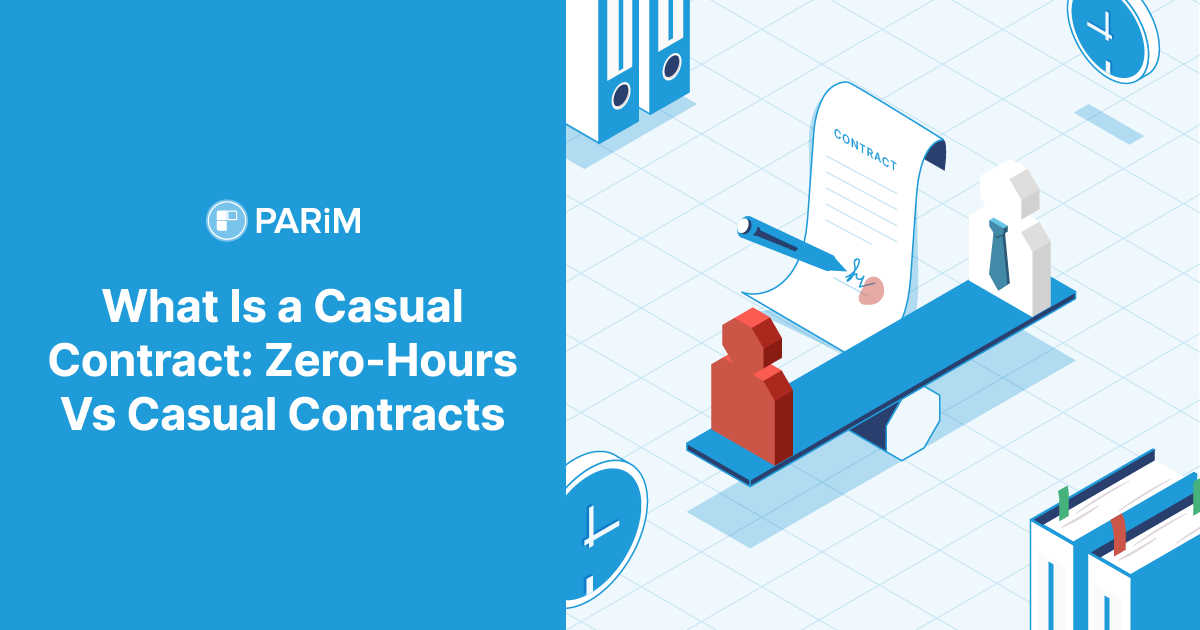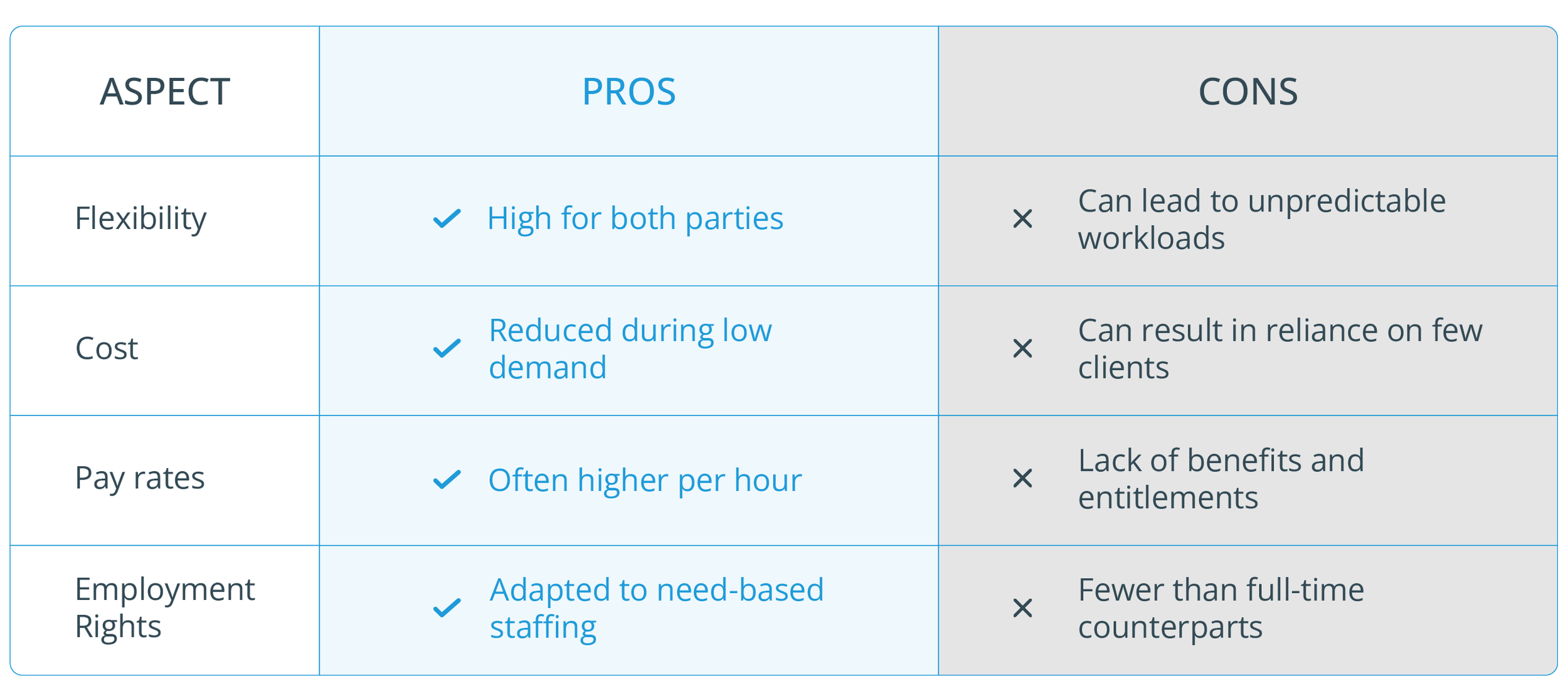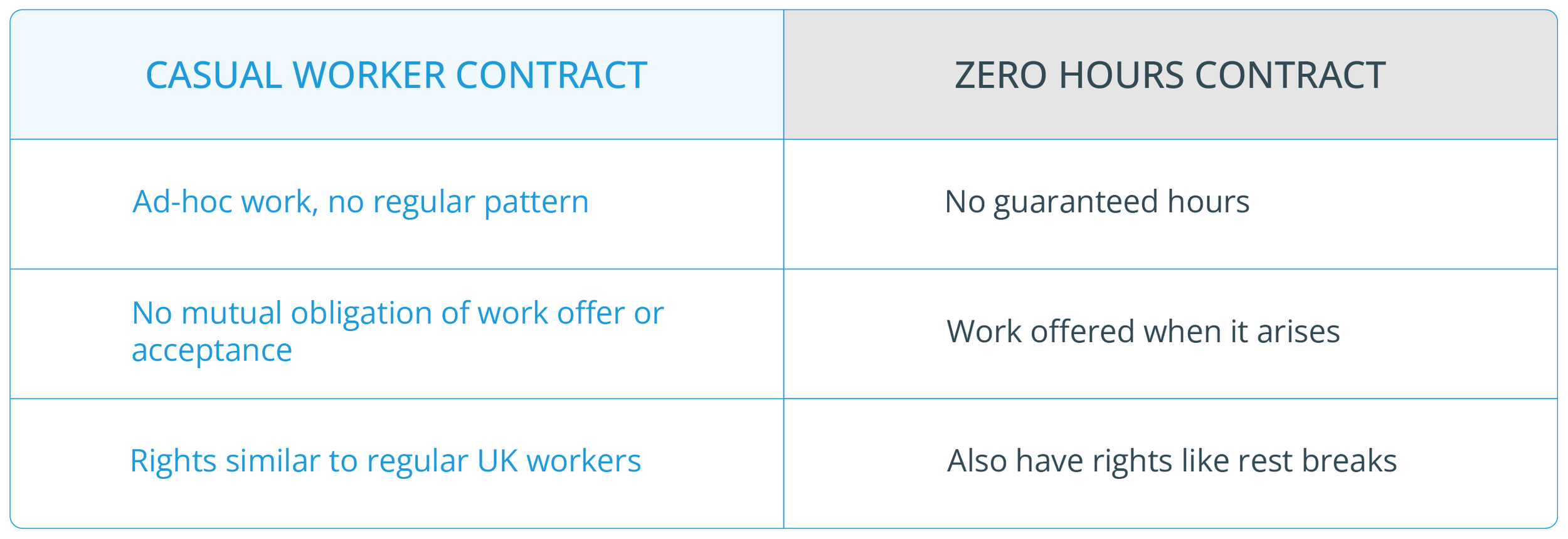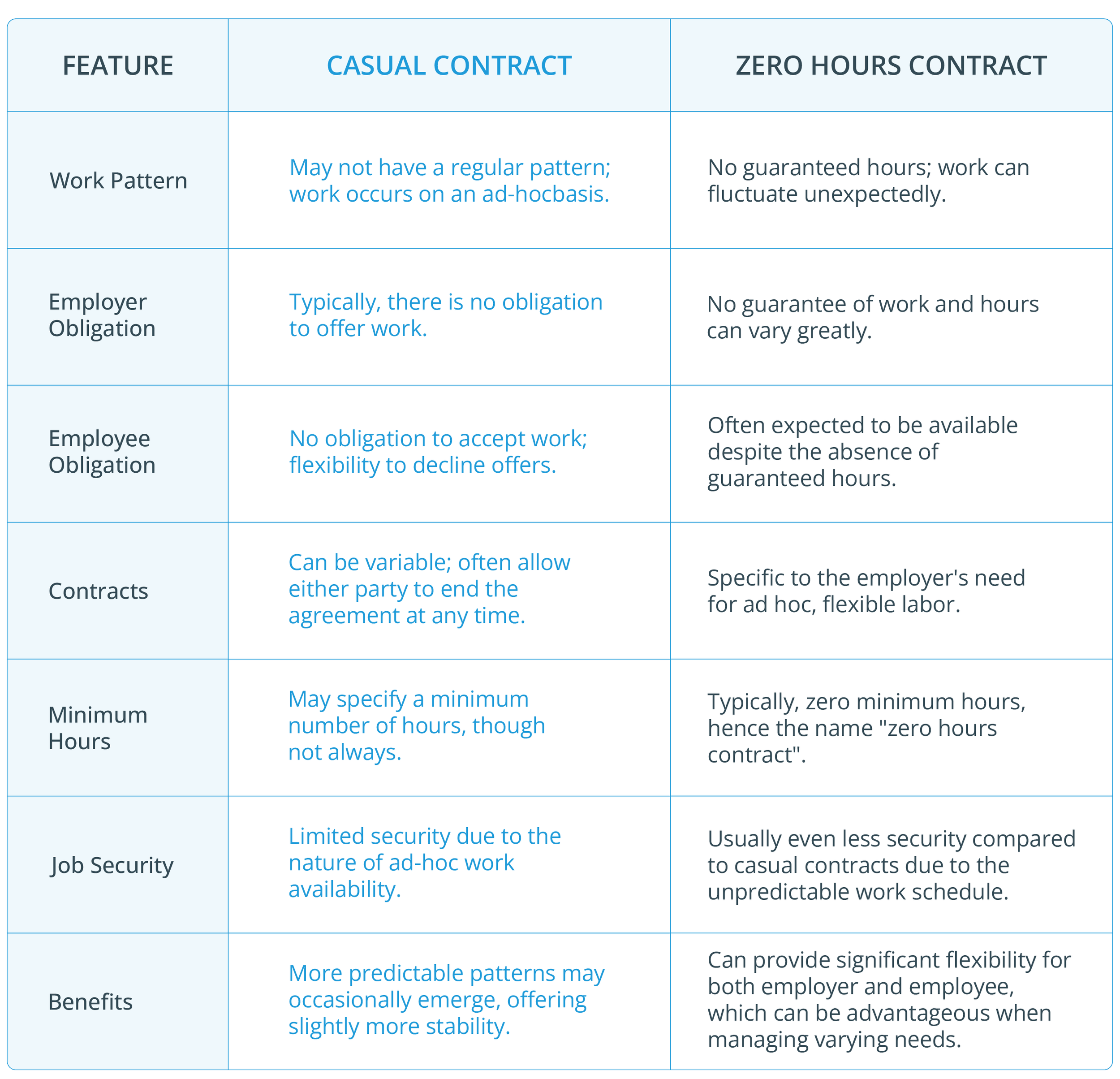What Is a Casual Contract: Zero-Hours Vs Casual Contracts
A casual contract represents an employment agreement that differs significantly from full-time or part-time contracts.
Unlike traditional employment contracts, which feature a set number of hours and a stable work schedule, casual contracts enable businesses to employ staff on an as-needed basis without committing to a fixed schedule.
Often synonymous with zero-hour contracts, these agreements allow for the hiring of casual staff to fill short-term or fluctuating demands, providing companies with a flexible workforce.
In this article, we will examine the nuances of casual work, explore the definition of a casual worker, and discuss the practical applications and considerations of engaging casual staff through casual contracts.
What Is a Casual Contract?
Casual contracts are a form of employment agreement wherein the worker is employed on an as-needed basis without fixed hours or a guarantee of ongoing work.
This arrangement signifies that an employee under a casual contract usually has the flexibility to accept or decline the work offered by the employer.
Characteristics of casual employment include:
Flexibility: The employee is not bound by a set number of working hours.
Ad hoc basis: Work is offered as it becomes available, with no obligation for consistent work schedules.
Hourly Pay: Compensation is typically calculated based on the actual hours worked.
Further Reading: IR35
Pros and Cons of Casual Contracts
Casual contracts refer to employment agreements where the worker has no guaranteed hours and is often employed on an as-needed basis.
These types of contracts offer flexibility for both employers and employees but come with certain trade-offs.
Pros
Flexibility: Employers can respond to changes in demand without the commitment of fixed hours, making staffing highly adaptable.
Cost-Effective: Without the obligation to provide regular hours, employers reduce labour costs during slow periods.
Higher Pay Rates: To offset the lack of job security and benefits, casual workers often receive higher hourly wages.
Cons
Job Security: A key drawback for employees is the lack of stable income and job certainty.
Benefits: Casual workers typically do not have entitlements such as paid sick leave, annual leave, or company pensions.
Employment Rights: They may have fewer rights compared to permanent employees, and their rights may vary based on local employment laws.
Summary Table
Employers should weigh these factors, considering their specific business needs and the rights of casual employees under the applicable laws.
5 Different Types of Casual Employment in the UK
Casual employment in the UK covers various job types characterised by their non-permanent and flexible nature. They often cater to individuals seeking temporary work or requiring a work schedule accommodating other commitments.
Zero-Hour Contracts
Employees on zero-hour contracts are not guaranteed regular work hours. They are called upon as needed, offering a high level of flexibility. The structure suits those who seek occasional employment without the commitment to a fixed schedule.
Short-Hour Contracts
These contracts provide a guaranteed minimum number of hours per week. Workers have more stability compared to zero-hour contracts but still retain some flexibility. Businesses benefit from having a responsive workforce they can adjust based on demand fluctuations.
Freelance or Self-Employed Contracts
Freelancers operate independently and offer services on a project basis. They manage their workloads and typically handle multiple clients. This arrangement gives them significant control over their jobs and work-life balance.
Contractor/Subcontractor Agreements
Contractors engage with businesses often on a project-to-project basis, while subcontractors may be hired by contractors to complete specific tasks. Both arrangements allow for specialized labour on an as-needed basis.
Short-Term/Fixed-Term Contracts
Workers are engaged for a predetermined time or to complete a particular project. These contracts offer temporary employment that is often utilized for covering leave absences or seasonal work demands.
Casual employment contracts offer various levels of flexibility and security, and both employees and employers need to understand the rights and obligations associated with each type.
Further Reading: Is Saturday a Working Day UK?
What’s the Difference Between a Casual Worker Contract and Zero Hours Contract?
A casual worker contract typically refers to an employment arrangement where the individual works as needed. The defining feature is the lack of a guarantee of regular work; employment is offered only as work becomes available.
The meaning of a casual contract extends to situations absent mutual obligations; employers are not required to offer work, and the worker is not required to accept it.
In the UK, casual workers' rights are generally the same as those of regular workers, but the irregular nature of the work can lead to variable incomes.
Zero-hours contracts, while similar, do not ensure any set number of hours each week. The employer offers jobs as they arise, and the employee is free to accept or decline. Often associated with ‘on-call’ work, these contracts are prevalent in sectors where demand is unpredictable.
Casual Contract Vs Zero Hours Contract: Comparison Chart
Are Casual Contracts Unfair or Unethical?
Casual contracts often generate debate regarding their fairness and ethical standing. These agreements provide flexibility for employers, requiring workers to be available on an as-needed basis without guaranteeing regular hours.
While some view this flexibility as a benefit, others perceive it as a potential for exploitation due to the worker's lack of job security.
The rights of Casual Workers in the UK include:
Pay: Casual workers must be paid at least the National Minimum Wage.
Rest Breaks: They are entitled to rest breaks per the Working Time Regulations.
Health and Safety: Employers must ensure their health and safety at the workplace.
On the other hand, casual workers might not have access to:
Sick Pay: Statutory sick pay may not be available to them.
Redundancy Pay: They typically do not receive redundancy payments.
Unfair Dismissal Protection: Protection against unfair dismissal is not usually provided unless they can prove a long-standing relationship with the employer, potentially qualifying them as employees.
When Does a Casual Worker Become an Employee?
A casual worker occupies a unique position within the labour market. They are often characterised by the flexibility of their work arrangement. Typically, they provide services without a fixed or regular schedule to meet the fluctuating demands of the employer.
While they enjoy working flexibly, they usually have fewer employment rights than permanent employees.
A casual worker in the UK may transition to employee status through:
Casual Conversion: This is a formal process in which a casual worker is offered the opportunity to become a permanent employee. This happens after a certain period or based on their consistent working pattern.
Contract Acceptance: A casual employee may become permanent when they accept an offer for full-time or part-time employment. This is often codified in a new employment contract.
It's essential for employers to be clear about the employment status in the contract.
Employment rights, such as notice of termination or redundancy pay, may vary with changes in status.
5 Tips to Manage Casual Staff
Clear Communication
Employers must set clear expectations during the onboarding process regarding what casual staff can anticipate in terms of duties and workplace culture.
Both parties should understand the terms of the casual workers' agreement, including how and when they will be called to work.
Integration
A key aspect of managing casual employees is to make them feel a part of the team despite their irregular hours. Ensuring casual staff are integrated can improve morale and encourage a more cohesive working environment.
Flexibility with Opportunities
Since casual staff often enjoy the flexibility of their work arrangement, managers should be accommodating with work offers. This allows casual staff to accept or decline shifts.
Regular Reviews
It's important to regularly review the arrangements with casual staff. This ensures both sides are satisfied with the agreement and can address any changes in availability or business needs.
Fair Treatment
Treating casual staff fairly and with respect, just as with other employees, helps maintain a positive and productive workplace. This includes fair access to shifts and adherence to the casual workers' agreement concerning hours and conditions of work.
Further Reading: Night Shift Pay Rate UK
Key Takeaways on Casual Work Contracts
A casual work contract characterizes an employment agreement where the individual is hired on an as-needed basis without a guaranteed number of hours.
Casual contracts are especially beneficial to businesses experiencing fluctuating demands or seasonal peaks, as they provide the flexibility to offer work only when needed.
Employees under these contracts are paid at an hourly rate, often including a casual loading—a percentage increase over the base pay as compensation for the lack of benefits like sick leave or annual leave that permanent employees enjoy.
Employers are advised to explicitly state the casual nature of the employment within the contract to prevent any misclassification issues.
They should identify any terms or conditions which they intend to rely on during the employment period, ensuring these are clearly documented to avoid future disputes.
FAQs
Do Casual Workers Need to Be on Payroll?
Casual workers should be included on the payroll. Maintaining records and ensuring tax obligations are met is necessary as they are employed and remunerated by the company.
What Are the Casual Workers' Rights After 2 Years?
Casual workers in the UK accrue certain employment rights after two years. These may include the right to request a permanent contract and protection against unfair dismissal.
These rights are subject to various factors, such as continuity of work and contract conditions.
When Does a Casual Worker Become Permanent in the UK?
A casual worker may become permanent in the UK after two years of continuous employment. However, this can depend on the employer's policies and the nature of the employment. Each situation will vary, impacting the worker's eligibility for permanent status.
Is Paying Casual Workers Cash Legal in the UK?
While paying casual workers cash is not illegal, all payments must be recorded and reported to HM Revenue and Customs (HMRC). Employers are responsible for deducting the right amount of tax and National Insurance through PAYE.
What Is a Variable Hour Contract?
A variable hour contract is one where the worker has no guaranteed number of hours and their work schedule may fluctuate.
Casual contracts often fall into this category, providing flexibility for both employees and employers but with varying levels of job security.






